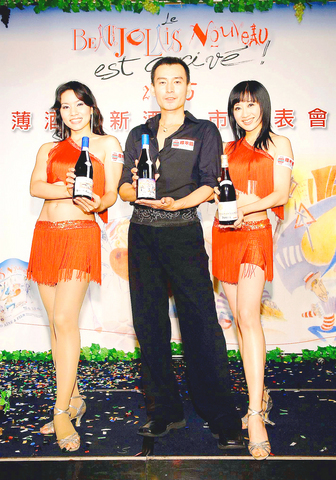The nation's love for Beaujolais Nouveau is growing quickly, making Taiwan Asia's second largest importer of the fruity French wine after Japan, retailers said.P>
Imports of Beaujolais wines are expected to top 800,000 bottles this year, up from 650,000 last year, and include affordable products available in convenience stores and supermarkets.
"It has become a fad in Taiwan, so wine lovers here have been expecting its arrival and are keen to savor the latest batch of Beaujolais," said Margery Ho (何默真), public relations official of the hypermarket chain RT-Mart (大潤發).

PHOTO: WANG MENG-LUN, TAIPEI TIMES
In keeping with the annual tradition, the wines will be uncorked in three days -- the third Thursday of November.
Although the harvest slumped by 50 percent, the quality of this year's wine, which hails from the Beaujolais wine-growing region south of Burgundy, is said to be comparable to that in 1929, 1947 and 1976, according to the Landis Taipei Hotel.
"It could be the best in the past century," the hotel said in a press release to promote its Beaujolais meal specials.
RT-Mart, which aims to grab a bigger share of the market, plans to present more high-quality Beaujolais this year, while maintaining its overall number of imports at about 150,000, the same as last year.
In addition to the three categories of wine -- Beaujolais, Beaujolais Villages and Beaujolais Crus -- RT-Mart is also offering limited-edition exquisite wines by the French firm Grand Vin Selles, Ho said.
This is aimed at tapping into another niche market, while continuing to promise the lowest prices in Taiwan for Beaujolais wines, she added.
Carrefour SA, the world's second-largest hypermarket operator, also entrusted the winery Georges Duboeuf -- dubbed the "King of Beaujolais" -- to produce the retailer's own-brand Beaujolais wines, which will be available in its outlets worldwide at much cheaper prices, said Dream Lin (林夢紹), public relations manager of Carrefour Taiwan.
Carrefour Taiwan expects to import 60,000 bottles of Beaujolais wines this year, up 30 percent from last year, including vintages from the famous wine-maker Henry Fessy.
Due to cut-throat competition, the retailers are keeping their selling prices top secret, waiting until the last minute to reveal them.
"I don't think the price will go under NT$200 [US$6] a bottle, which happened last year," Lin said, explaining that rising transportation charges this year should keep the prices at a higher level.

Merida Industry Co (美利達) has seen signs of recovery in the US and European markets this year, as customers are gradually depleting their inventories, the bicycle maker told shareholders yesterday. Given robust growth in new orders at its Taiwanese factory, coupled with its subsidiaries’ improving performance, Merida said it remains confident about the bicycle market’s prospects and expects steady growth in its core business this year. CAUTION ON CHINA However, the company must handle the Chinese market with great caution, as sales of road bikes there have declined significantly, affecting its revenue and profitability, Merida said in a statement, adding that it would

MARKET LEADERSHIP: Investors are flocking to Nvidia, drawn by the company’s long-term fundamntals, dominant position in the AI sector, and pricing and margin power Two years after Nvidia Corp made history by becoming the first chipmaker to achieve a US$1 trillion market capitalization, an even more remarkable milestone is within its grasp: becoming the first company to reach US$4 trillion. After the emergence of China’s DeepSeek (深度求索) sent the stock plunging earlier this year and stoked concerns that outlays on artificial intelligence (AI) infrastructure were set to slow, Nvidia shares have rallied back to a record. The company’s biggest customers remain full steam ahead on spending, much of which is flowing to its computing systems. Microsoft Corp, Meta Platforms Inc, Amazon.com Inc and Alphabet Inc are

RISING: Strong exports, and life insurance companies’ efforts to manage currency risks indicates the NT dollar would eventually pass the 29 level, an expert said The New Taiwan dollar yesterday rallied to its strongest in three years amid inflows to the nation’s stock market and broad-based weakness in the US dollar. Exporter sales of the US currency and a repatriation of funds from local asset managers also played a role, said two traders, who asked not to be identified as they were not authorized to speak publicly. State-owned banks were seen buying the greenback yesterday, but only at a moderate scale, the traders said. The local currency gained 0.77 percent, outperforming almost all of its Asian peers, to close at NT$29.165 per US dollar in Taipei trading yesterday. The

The US overtaking China as Taiwan’s top export destination could boost industrial development and wage growth, given the US is a high-income economy, an economist said yesterday. However, Taiwan still needs to diversify its export markets due to the unpredictability of US President Donald Trump’s administration, said Chiou Jiunn-rong (邱俊榮), an economics professor at National Central University. Taiwan’s exports soared to a record US$51.74 billion last month, driven by strong demand for artificial intelligence (AI) products and continued orders, with information and communication technology (ICT) and audio/video products leading all sectors. The US reclaimed its position as Taiwan’s top export market, accounting for